Bracing for Bannon: Europe isn't sure it wants to be remade in Trump's image
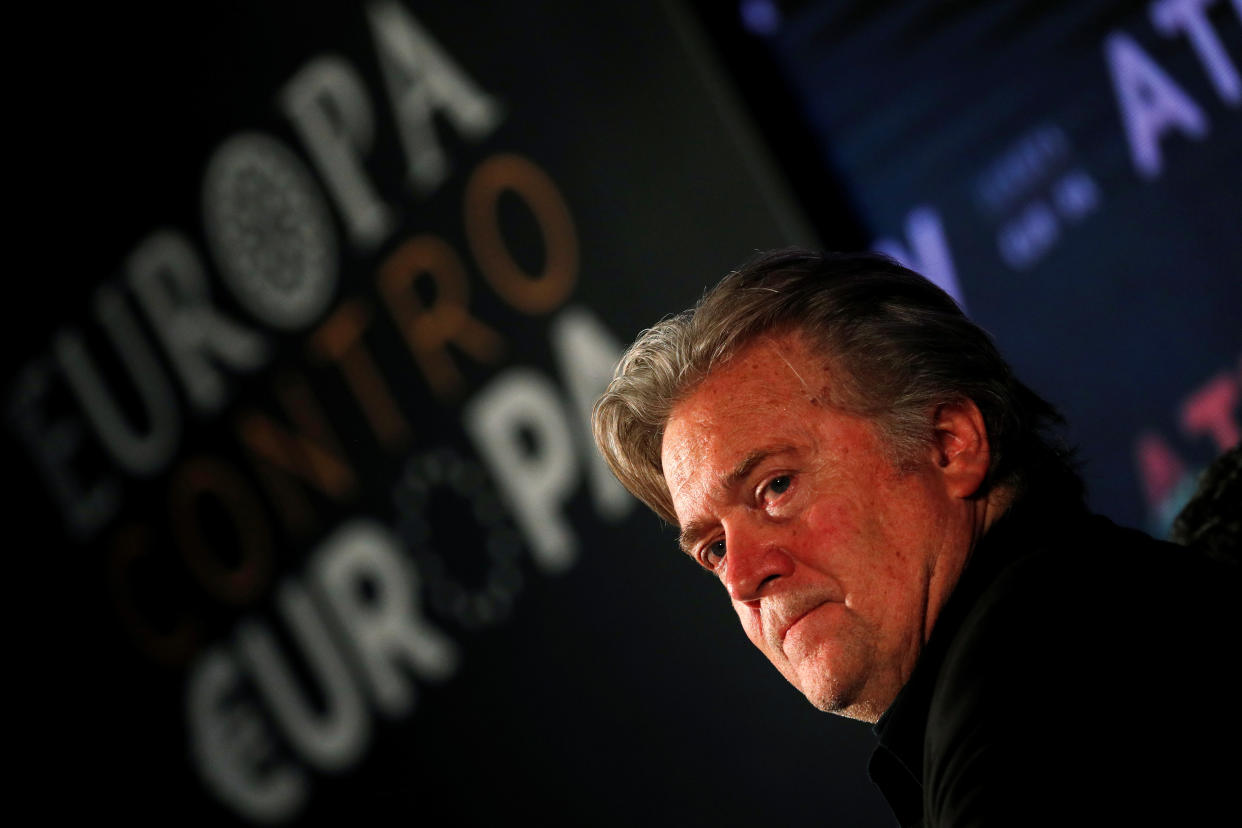
BARCELONA — With the clock ticking down to the U.S. midterms, Europe is bracing for the return of Steve Bannon, who plans, as early as next week, to resume his campaign to remake European politics in the bellicose mold of Donald Trump.
He will arrive with a well-funded demolition team of pollsters, strategists, message massagers and TV booking agents — a reincarnation of his campaign war room, now dubbed “the Movement”: part foundation, part loose alliance of populist/nationalist parties and part one-stop political campaign machine. Its mission: blowing up the existing power alignment and dominant liberal mindset of the 28-nation European Union, which stretches from Portugal to Romania, Finland to Malta. The wealthiest trading bloc in the world, the EU has been targeted by Trump as a “foe.”
Bannon first descended on Europe this winter, after he was declared persona non grata in the White House over his indiscreet babbling to journalist Michael Wolff. More recently, he has been criss-crossing the United States, speaking to mostly empty rooms, on behalf of obscure Republican candidates who don’t always bother to show up with him. But the weakening of the EU has been going on in his absence, with Britain Brexiting, Germany facing an uncertain future after the announced departure of EU heavyweight Chancellor Angela Merkel, Deputy Prime Minister Matteo Salvini of Italy threatening to suspend compliance with EU rules, and the increasingly unloved French president, Emmanuel Macron, pleading with Europeans to fight against the nationalist “leprosy.”
The test will come in May, when elections are scheduled for the 751-seat European Parliament. Bannon aims to help nationalist and other hard-right parties get elected to at least one-third of those seats, which would essentially create a bloc with a veto over any proposals.
Roland Freudenstein, deputy director of the Wilfried Martens Centre for European Studies, warns that Bannon can “do serious damage to public discourse” and says he won’t be surprised if the American cooks up “A European-style Pizzagate.” Freudenstein is expecting a Bannon-directed onslaught of fake news and propaganda once the strategist sets up his Movement headquarters in Brussels, and deploys his tools, including sophisticated polling, rapid-fire dissemination of fiery talking points and internet targeting of potential voters. Currently, operations are being run out of the mansion of Belgian lawyer Mischaël Modrikamen, Bannon’s partner in the Movement, in a wealthy suburb of Brussels.
The European Parliament is apparently expecting the worst: Last week, it passed a resolution calling on EU member countries to protect voters from manipulation by data harvesters like Cambridge Analytica, the political consulting firm Bannon helped run.
But right-wing parties are rolling out the red carpets at the news that Bannon’s leased private jet — the only way the populist agitator, who condemns the global elite, travels these days — will soon be touching down in the Old World.
Among those cheering his imminent arrival: the pro-life, anti-immigrant Vox party in Spain, the first Spanish ultra-right party to attempt to escape the taint of the nation’s fascist past since the death in 1975 of longtime dictator Francisco Franco. Lending his imprimatur to Vox — which was formed four years ago to counter separatist movements in Catalonia and other regions in Spain — Bannon brought the party copious media attention and sent it shooting higher in the polls.
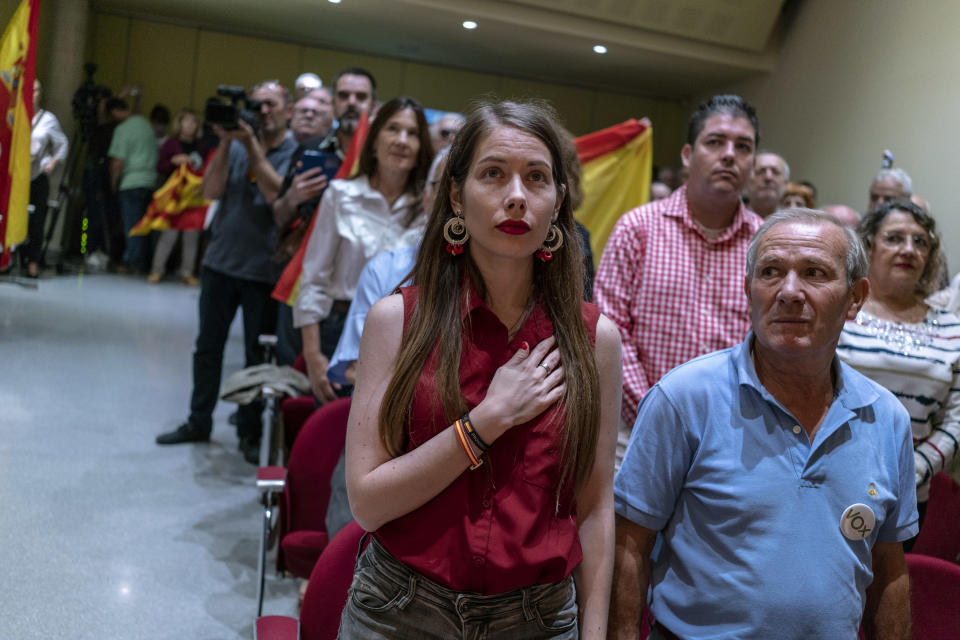
Elsewhere across Europe, an influx of refugees from the Mideast and Africa, and a series of bloody terror attacks by Islamic radicals, has led to the rise of anti-establishment parties — from the Freedom Party, formed 12 years ago to halt “the Islamization of the Netherlands,” and now the second-largest party in the Dutch Parliament, to the anti-immigration League, now calling the shots in Italy’s ruling coalition.
“Europe is going through significant political changes,” said Matthew Goodwin, visiting senior fellow at the London think tank Chatham House and author of National Populism: The Revolt Against Liberal Democracy. “We’re seeing these parties break through in democracies that haven’t seen many populist movements before — in Germany, Sweden, the U.K.” He says that voters don’t feel loyal to the main political parties and that “the political system is far more volatile” as a result.
Bannon’s take: “Europe is on fire!” It’s “the center of the political universe!”
“Macron and Merkel are in death spirals,” he told Yahoo News’ Alex Nazaryan. “And Hungary’s [Viktor] Orbán and Italy’s [Matteo] Salvini are the opposing force.”
Which is to say Bannon correctly smells blood and is zeroing in for the kill. And it’s not just blood he smells. Bannon says “wealthy Europeans” are donating millions to the Movement, which he would like to be seen as a right-wing counter to the Open Society Foundations, founded — and funded — by the billionaire George Soros. Bannon reportedly charges as much as $20,000 for speeches, in which he tests out new themes and refines his talking points. His public talks fill halls with listeners who pay as much as $40 a ticket.
That’s a far better reception than he has been getting in the States, where his grandiose plan to remake the Republican Party by electing his own slate of senators to vote out Majority Leader Mitch McConnell never recovered from Bannon’s endorsement of Roy Moore, who performed the incredible feat for an Alabama Republican of losing to a Democrat. Bannon’s “Red Tide Rising” campaign tour took him last month to such high-profile venues as the volunteer firehouse in Elma, N.Y., where he attracted a crowd of 200 enthusiastic Republicans — not including any of the candidates he was supposed to be stumping for. His new propaganda film, Trump@War, rife with scenes of violent Democratic mobs, is flopping spectacularly: a mere three dozen people showed up for a free screening in Staten Island.
In Tampa, a scheduled GOP fundraiser dinner celebrating two years of Trump’s presidency, featuring the “amazing speaker” Steve Bannon and his new film, drew such a tepid response, according to a report in the Tampa Bay Times, that organizers slashed prices, filling the 250-seat venue only when tickets were offered free. Just two candidates appeared — one running for the state legislature, the other for the county water board.
But in Europe, the Movement has been signing up member parties right and … even farther right. Besides the League and Vox, National Rally, as Marine Le Pen’s French party is now called — after wavering — is giving a hesitant oui. (Parties don’t have to pay Bannon to participate, although they must be invited.) Even Brazilian congressman Eduardo Bolsonaro, son of Brazil’s nationalist president-elect, is interested in joining “forces, especially against cultural Marxism.”
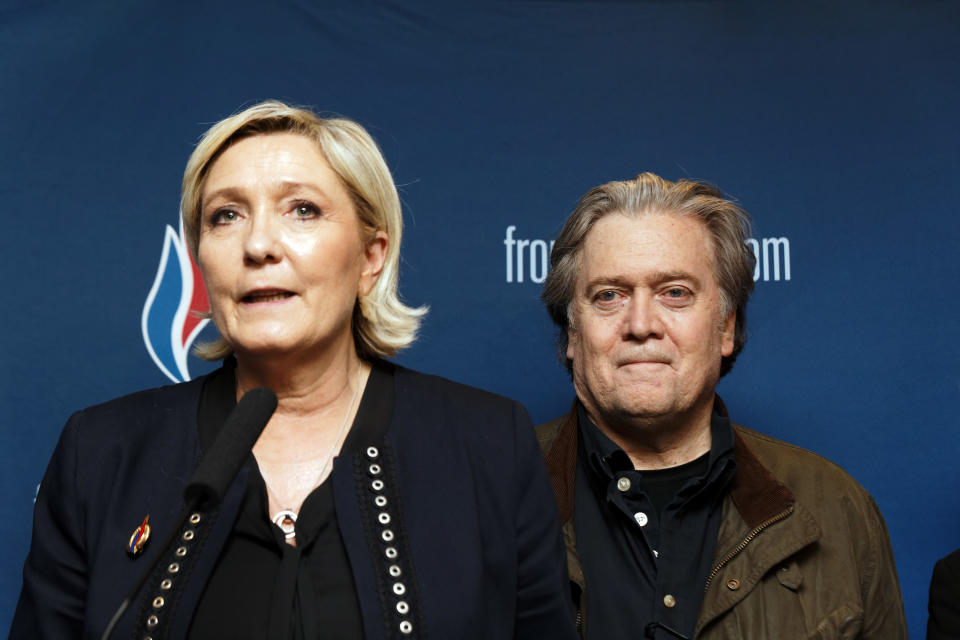
At least Bannon has a consistent message. Speaking in Budapest, he branded Hungary’s prime minister Viktor Orbán, who erected a border fence to keep out “Muslim invaders,” as “Trump before Trump!” Just a few weeks before, in Zurich, he had also used that label to refer to billionaire Christoph Blocher, the vice president of the anti-immigrant Swiss People’s Party, who has been influential in keeping Switzerland out of the EU.
Salvini, a strident, openly racist ideologue who heads Italy’s Northern League party, was designated “Italy’s version of Trump.”
Bannon didn’t compare Marine Le Pen, leader of France’s nationalist, populist and anti-EU National Rally (formerly the National Front) directly to Trump. But he made the point indirectly, asserting in a speech to members of the party that the “opposition party media” and “globalist elite” had kept the National Front out of power by disparaging it with negative reporting:
“You argue for sovereignty, they call you a nationalist,” he began. “You argue for freedom, they call you a xenophobe. You argue for your country, they call you a racist.” Well, he announced, the days of those smears from globalists were over. “Let them call you racists,” he said. “Let them call you xenophobes. Let them call you nativists. Wear it as a badge of honor. Because every day we get stronger and they get weaker.”
Not every right-wing European party wants to be part of Bannon’s Movement. Germany’s Alternative for Deutschland, an antiforeigner, anti-Islam party that won 94 seats in Germany’s 598-seat Parliament last year, declined membership in his club, predicting the Movement “will not succeed.” Belgium’s nationalist Flemish party, Vlaams Belang, wants “nothing to do with it.” Poland’s Law and Order party has said it won’t join, as has Austria’s Freedom Party. Even Hungary’s Fidesz, led by Orbán, hasn’t signed on.
And there has been pushback from the left. Partnering with Bernie Sanders to launch a worldwide network of liberals called Progressives International, Yanis Varoufakis, the former Greek finance minister, is planning an all-out assault on Bannon’s plans. Using the slogan “Hope is back!” he just announced a new coalition of leftist parties — European Spring — to run in May’s European elections against “nationalists, right-wing populists and rabble-rousers.” While it’s unclear if he plans to debate Bannon in public forums, Varoufakis told BuzzFeed he is spoiling for a showdown with the American, saying “Let’s have a big fight.”
European parliamentarian Sophie in ’t Veld, a delegate from the Netherlands, makes the case that Bannon has misjudged the European political scene. “It will take more than the Bannon charm to repeat, here in Europe, the wonderful work he has achieved on behalf of huddled masses and Christian zealots in the U.S.,” she wrote in an article titled “The Kids Aren’t Alt-Right.”
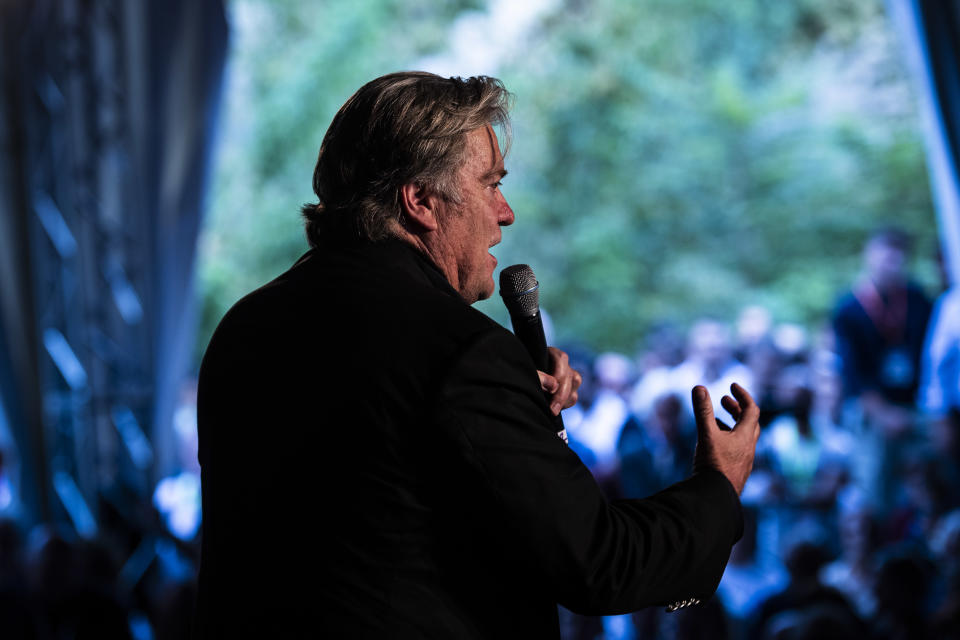
Bannon has had some of his most notable successes in southern Europe. Of all the European hotspots where the jet-setting populist agitator checked into luxury hotel suites, none thrilled Bannon more than Rome, where he is involved with an ultraconservative Catholic think tank, the Dignitatis Humanae Institute. His documentary “Torchbearer,” a warning about what happens to empires that abandon God, narrated by long-bearded “Duck Dynasty” patriarch Phil Robertson, looking like a deranged Moses, was made there.
During the run-up to Italy’s 2018 general elections, Bannon became “fascinated” with Salvini’s League party, formerly known as Northern League. It began as a Milan-based secessionist party that demonized Southern Italians, but is now fueled by anti-immigrant fervor. Seeing the “star quality” of Salvini, a 45-year-old ex-Communist, Bannon visited him in February — around the time that Italian media noted a change in the League’s campaign motto to “Italians First!”
When Bannon returned to Rome in March, his likeness was splashed across the front page of Italy’s most-read paper on election day, under the headline: “It feels like the same climate just before Trump.”
The League came in third, forming a coalition government with the first-place party, Five Star. Salvini ended up as minister of the interior and deputy prime minister, garnering worldwide notoriety for barring rescue ships, which had picked up capsized Africans, from docking at Italy’s ports.
Bannon trumpeted Italy’s election worldwide, boasting that the fact that half of Italians had voted for anti-establishment parties is a harbinger of a populist uprising in Europe.
Spain, like Portugal, had seemingly been inoculated against right-wing nationalism by its decades-long experience with fascism. In 2014, however, frustrated members of the Popular Party — Spain’s conservative mainstay — defected to create the more extreme Vox party, which wants to erect a concrete wall in Spain’s two tiny North African enclaves to keep out illegal immigrants. More radically, Vox aims to dissolve the country’s 17 autonomous governments and centralize power in capital Madrid — a proposal akin to eliminating all state governments, courts and legislatures in the United States.
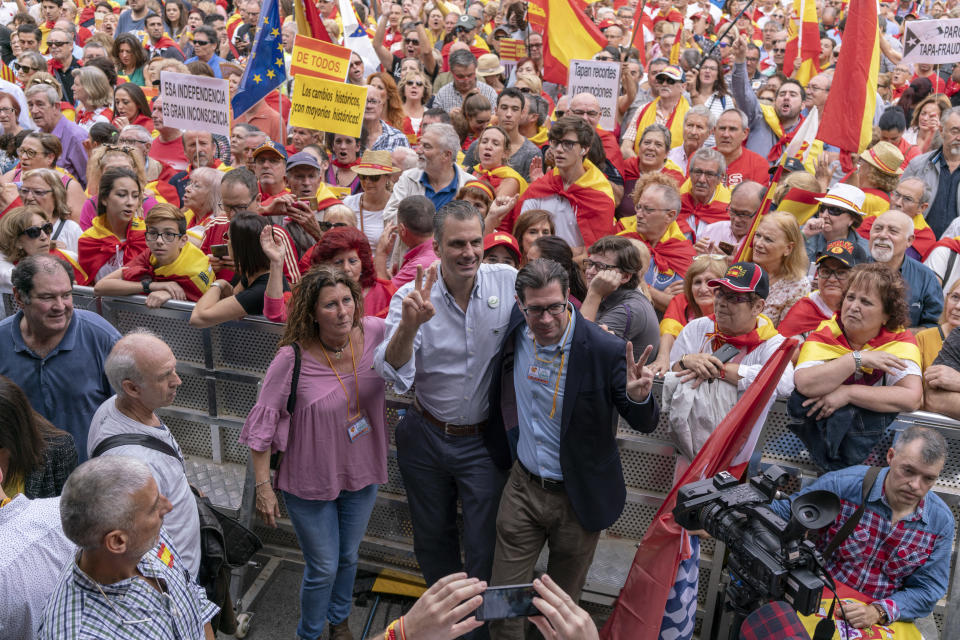
With no seat in any legislative bodies, and boasting only 5,000 members early this year, Vox made headlines this spring when it announced that Bannon was coming to Madrid to consult. But after months of promises, Bannon was a no show. “He’s mercurial,” explained Secretary General Javier Ortega at an appearance in Barcelona. “He changes his mind, but he doesn’t tell anybody.”
Bannon still hasn’t appeared in Madrid, but Bannonismo (and Trumpismo) have nevertheless bolstered Vox. Early this month, some 10,000 Spaniards piled into Madrid’s Vistalegre Palace, where the party’s two handsome leaders jolted the crowd into a flag-waving frenzy.
“Together,” promised buff Secretary-General Javier Ortega, “we will make Spain great again!” The crowd roared.
Then the strapping Santiago Abascal, a former legislator in the Basque region, in the north, took the microphone. Abascal carries a Smith & Wesson, practically unheard of in Spain. “If you love your country,” he began, channeling Bannon, “you are called a xenophobe and a fascist. If you say immigration needs to be controlled, you are racist and fascist. If you love tradition, you are backward and fascist…”
But from now on, Abascal vowed, “We will wear the insults like medals on our chest.”
The following week, in a notable first, Ortega, whose party was previously shunned as “ultra right,” marched alongside leaders of mainstream conservative parties, the Popular Party and Ciudadanos, in Barcelona’s celebration of Hispanic Day, which attracted thousands of supporters. The party now claims more than 11,000 members.
Just last week, a new poll showed that over 5 percent of Spanish voters now put their money on Vox, giving the long-shot party a good chance of taking seats in May’s elections for the European Parliament. And headlines proclaimed that Steve Bannon would be coming to Spain to meet with Vox officials by the end of the year.
Additional reporting by Alexander Nazaryan in Washington
Melissa Rossi, a writer based in Barcelona, is the author of the geopolitical book series “What Every American Should Know.” (Plume/Penguin).
_____
Read more from Yahoo News:
The CIA’s communications suffered a catastrophic compromise. It started in Iran.
Ending the Qatar blockade might be the price Saudi Arabia pays for Khashoggi’s murder
How Robert Mercer’s hedge fund profits from Trump’s hard-line immigration stance
Trump’s target audience for migrant caravan scare tactics: Women
Photos: Worldwide Google walkout over sexual harassment, racism and pay inequality


